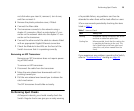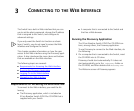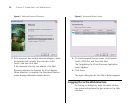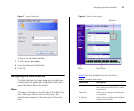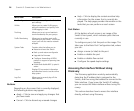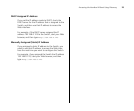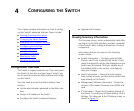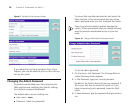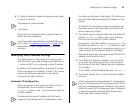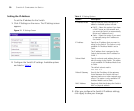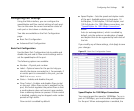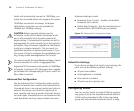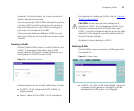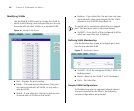
4
CONFIGURING THE SWITCH
This chapter provides information on how to config-
ure the Switch’s advanced features. Topics include:
■ Viewing Summary Information
■ Changing the Admin Password
■ Modifying the IP Address Settings
■ Configuring Port Settings
■ Configuring VLANs
■ Configuring Trunking
■ Monitoring Traffic
■ Using the System Tools
Configuration Overview
The Switch is shipped ready for use. If you only want
the Switch to function as a basic layer 2 switch, you
do not need to access the Web interface and config-
ure the Switch.
You only need to access the Web interface if you
want to:
■ Set the administration password to the Web inter-
face
■ Assign an IP address to the Switch
■ Configure the Switch’s advanced features
■ Upgrade the firmware
Viewing Summary Information
The Summary screen, which automatically loads after
you log on to the Web interface, provides a snapshot
of the Switch’s basic settings and versions of current
components.
Information that you can view on the Summary
screen include:
■ System Information — Contains optional fields
that you can fill out to identify the Switch. It also
shows the object ID and the time elapsed since the
Switch was last started. After you update any of
the editable fields in this section, click Apply to
save your changes.
■ Switch Information – Shows the serial number,
total number of ports, and the version of the hard-
ware (board) on the Switch
■ Management Software Information – Shows the
versions of the loader (firmware), boot ROM, and
code
■ IP Information – Shows the IP address settings of
the Switch. To modify any of these settings, click IP
Settings. This takes you to the IP Settings screen, as
shown in Figure 11
.



